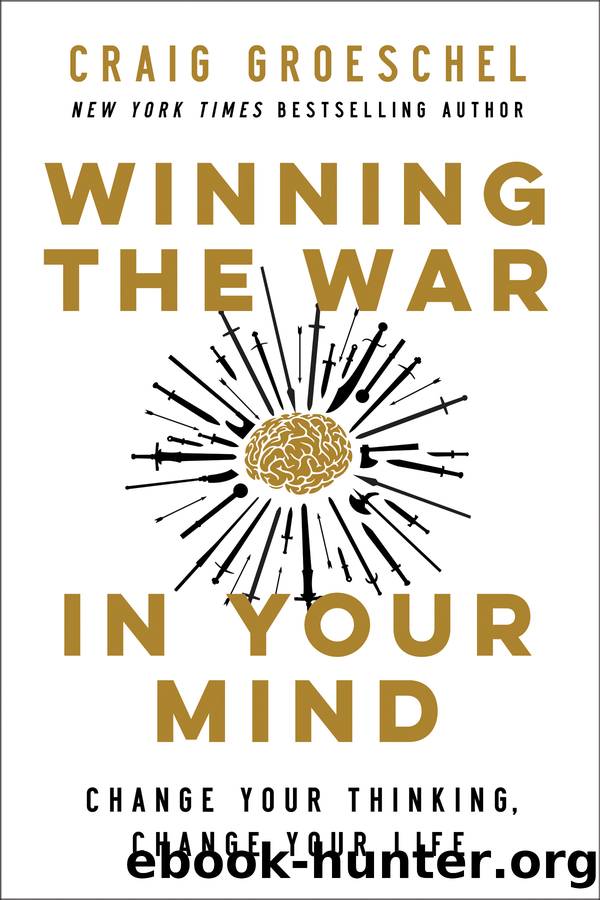Winning the War in Your Mind by Craig Groeschel

Author:Craig Groeschel
Language: eng
Format: epub
Publisher: Zondervan
Published: 2020-12-22T00:00:00+00:00
IâM NOT BIASED. YOUâRE BIASED!
Social psychologists have a name for our distorted lenses. They call it a cognitive bias. The term refers to a standardized, consistent pattern of deviating from reality in how we see and process things. If you have a cognitive bias, you create a subjective reality. That construction of your reality, not actual reality, will dictate how you respond and behave in the world.5
Thatâs a kind of scholarly way of thinking about cognitive bias, but you donât need that explanation. You see people with a cognitive bias all the time.
You might have a boss who gives the same feedback in the same way to two employees. One receives it as fair, constructive criticism. âThat really helped me see a flaw in how Iâm doing my job. I appreciate the feedback. This will improve my job performance.â
The other person is totally offended. âWho is she to come in here and say any of that? Who does she think she is? You want some feedback? Iâll give you some feedback!â
What is the difference? Cognitive bias.
Perhaps the second person had a demanding, insulting parent and now sees every authority figure through that lens.
Two people walk into the same worship service together. The first believes Christians are hypocrites and churches are always out for your money, especially megachurches, where itâs âall about numbers.â
The second would tell you Christians are not perfect but theyâre trying, and most mean well. She believes that God is alive and at work in all kinds of churches.
Those two people will experience the exact same service but have very different experiences. Why? Itâs not the facts that differ but the filter.
Studies show that cognitive bias can impact a personâs view of God. Your relationship with your earthly father often colors how you perceive your heavenly Father. If you had a good dad who was involved and full of compassion, it will be easier to view God as relational and caring about the details of your life. If you had a father who was absent or abusive, you are more likely to think of God as distant and disinterested. Same God. Different filter.
You can recognize cognitive bias in others, but can you in yourself?
Part of the problem is that we tend not to see our own cognitive biases. Because if we knew it was a bias, we wouldnât have one.
Thatâs why itâs so important to think about what you think about. You cannot defeat an enemy you cannot define. Ask probing questions to explore why you think what you think.
As Iâve practiced these disciplines over the past few years, Iâve discovered my cognitive bias toward believing Iâm not enough and needing to prove myself. And toward thinking that I donât have enough and need to get more to provide financial security.
Download
This site does not store any files on its server. We only index and link to content provided by other sites. Please contact the content providers to delete copyright contents if any and email us, we'll remove relevant links or contents immediately.
Winning the War in Your Mind by Craig Groeschel(540)
A World Ablaze by Craig Harline(505)
White Too Long by Robert P. Jones(470)
Beautiful Resistance: The Joy of Conviction in a Culture of Compromise by Jon Tyson(464)
The Mission by David W. Brown(460)
History of the Church by Eusebius(459)
In the Reign of King John by Dan Jones(457)
No More Christian Nice Guy by Paul Coughlin(430)
The Crusades: A History by Jonathan Riley-Smith(401)
Why Study History? by John Fea(387)
The Black Church by Henry Louis Gates Jr(372)
The Tale of the Tardy Oxcart (Swindoll Leadership Library) by Swindoll Charles R(371)
Three Messiahs : The Historical Judas the Galilean, the Revelatory Christ Jesus, and the Mythical Jesus of Nazareth (9781450259477) by Unterbrink Daniel T(367)
The History of Palestine by John Kitto(353)
A Spacious Life by Ashley Hales(347)
Assassination of a Saint by Eisenbrandt Matt(339)
Augustine of Canterbury by Robin Mackintosh;(323)
Border Lines: The Partition of Judaeo-Christianity (Divinations: Rereading Late Ancient Religion) by Daniel Boyarin(320)
The Zionist Bible (BibleWorld) by Masalha Nur(316)
